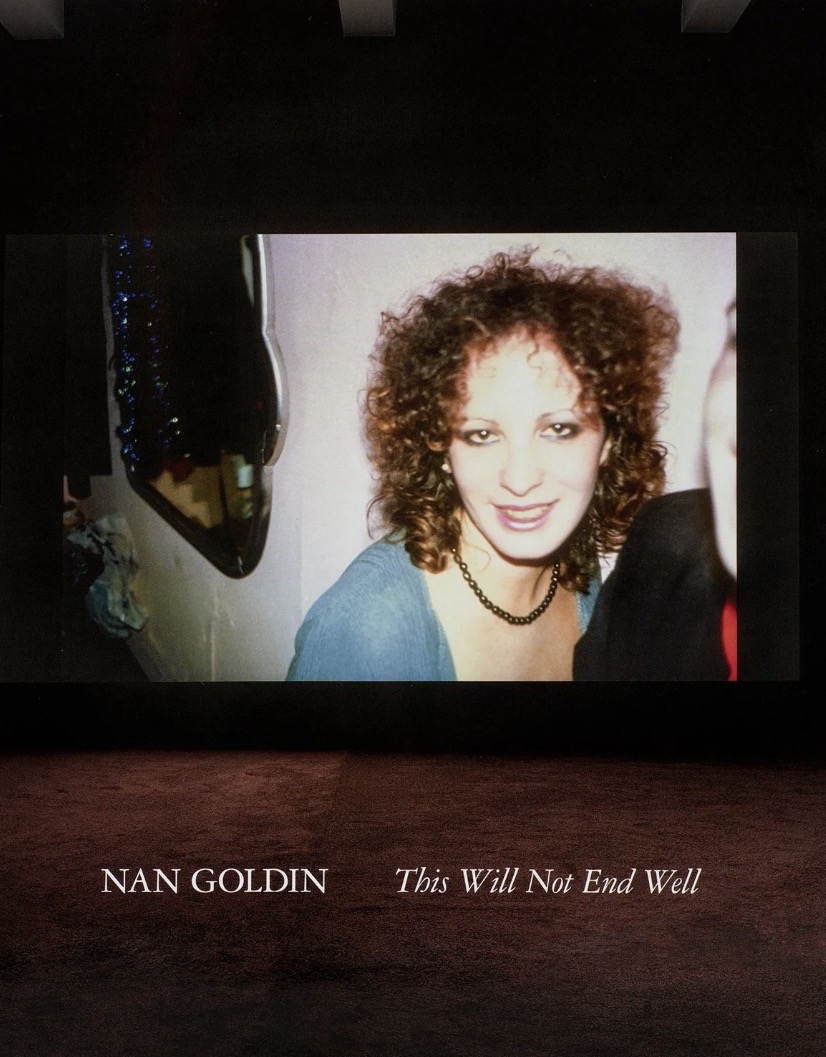“Nan Goldin: This Will Not End Well” is an essential companion to the retrospective exhibition of the same name, highlighting the profound impact of Goldin’s work as a filmmaker. Organized by Moderna Museet in Stockholm, the exhibition travelled to Stedelijk Museum Amsterdam, Neue Nationalgalerie in Berlin, and Pirelli HangarBicocca in Milan, showcasing Goldin’s evocative slideshows and films composed of thousands of photographs, film sequences, and audio and music tracks.
This well-curated catalogue captures the depth of Goldin’s artistic exploration. It addresses the trauma of her family history, intimate portrayals of her friends, and a haunting journey through addiction. The presentation format mirrors the slideshows and video works, with images seamlessly reproduced in sequence on a black background, maintaining the immersive quality of the original pieces.
Accompanying the visuals are twenty insightful texts, most of them newly commissioned by Goldin, which delve into the intention, power, and emotional resonance of her work. “Nan Goldin: This Will Not End Well” offers readers a meticulous understanding of Goldin’s artistic journey and the raw, unfiltered human experiences she captures.
The catalog’s structure, with images arranged in a continuous sequence, mirrors the fluid and dynamic nature of Goldin’s slideshows and films, creating an immersive experience for the reader. The twenty texts provide critical insights and reflections on the themes of trauma, addiction, and intimacy that permeate Goldin’s work, shedding light on her unique ability to intertwine personal and collective narratives.
“Nan Goldin: This Will Not End Well” is more than just a collection of artworks; it is a testament to Goldin’s enduring impact on contemporary art and her unflinching portrayal of life’s most challenging moments. This book is an invaluable resource for anyone seeking to delve deeper into Nan Goldin’s world and the many stories she tells through her art.
Nan Goldin, born in Washington, D.C., in 1953, is a photographer whose work has profoundly shaped the landscape of contemporary art. Her raw, deeply personal images capture the intensity of human relationships and the complexities of identity, trauma, and survival. Goldin’s journey began in the Boston area, where she grew up in a tumultuous household marked by the tragic suicide of her older sister, Barbara. This event left an indelible mark on her, fueling a lifelong exploration of pain, beauty, and the fragile nature of human existence.
In the late 1960s, Goldin fled her conservative upbringing, immersing herself in the vibrant countercultures of Boston and later New York City. It was here, amid the pulsating energy of the city’s underground scene, that she found her true voice. Goldin’s camera became an extension of herself, a tool for documenting the lives of her friends and lovers—many of whom were part of the LGBTQ+ community and the burgeoning punk scene.
Her seminal work, “The Ballad of Sexual Dependency,” presented as a slideshow set to music, is a raw, unflinching chronicle of her life and the lives of those around her. This groundbreaking piece, first shown in 1985, shattered traditional notions of documentary photography, merging the personal with the political and transforming the medium into a vehicle for storytelling and catharsis.
Goldin’s photographs are often intensely intimate, capturing the joy, heartbreak, addiction, and recovery moments. Her work delves into the complexities of human relationships, portraying her subjects with an honesty that is both tender and unrelenting. She does not shy away from the darker aspects of life, instead embracing them as integral parts of the human experience.
In the 1990s and early 2000s, Goldin’s work expanded to include themes of domesticity, motherhood, and the impact of the AIDS epidemic, which claimed the lives of many of her friends. Her activism became increasingly prominent, culminating in her recent efforts to combat the opioid crisis. In 2017, Goldin founded the organization P.A.I.N. (Prescription Addiction Intervention Now) to hold pharmaceutical companies accountable for their role in the epidemic, drawing on her own battle with addiction to advocate for change.
Goldin’s influence extends far beyond the art world. Her work has been exhibited in major museums and galleries worldwide, from the Whitney Museum of American Art to the Centre Pompidou. Her fearless exploration of the human condition inspires generations of artists and viewers alike, cementing her practice as one of the most important photographers of our time.

